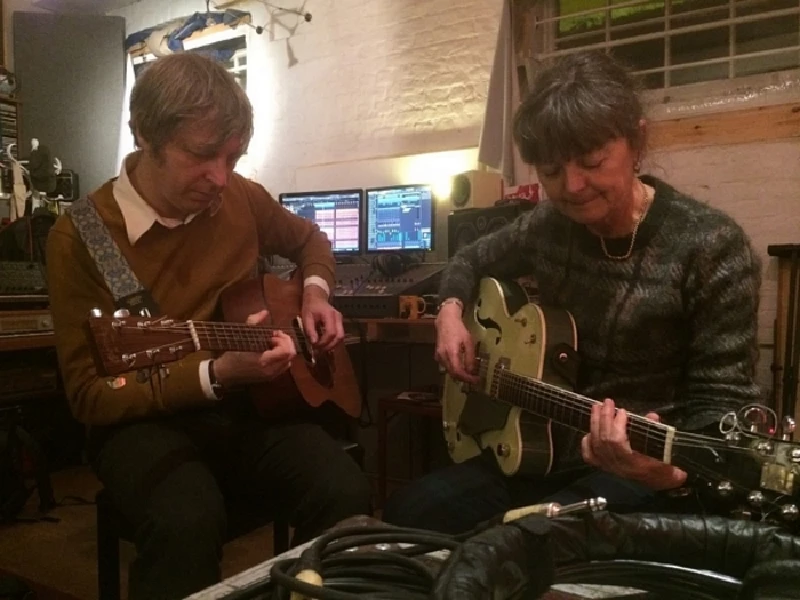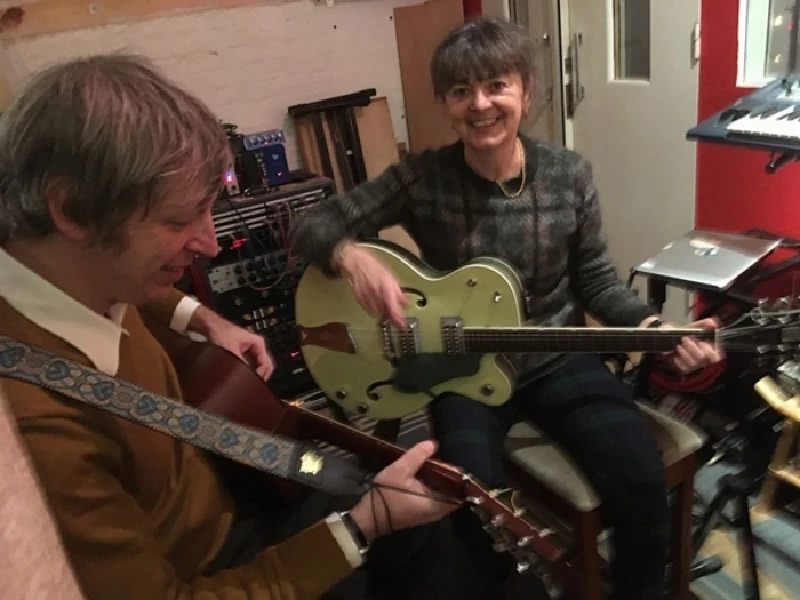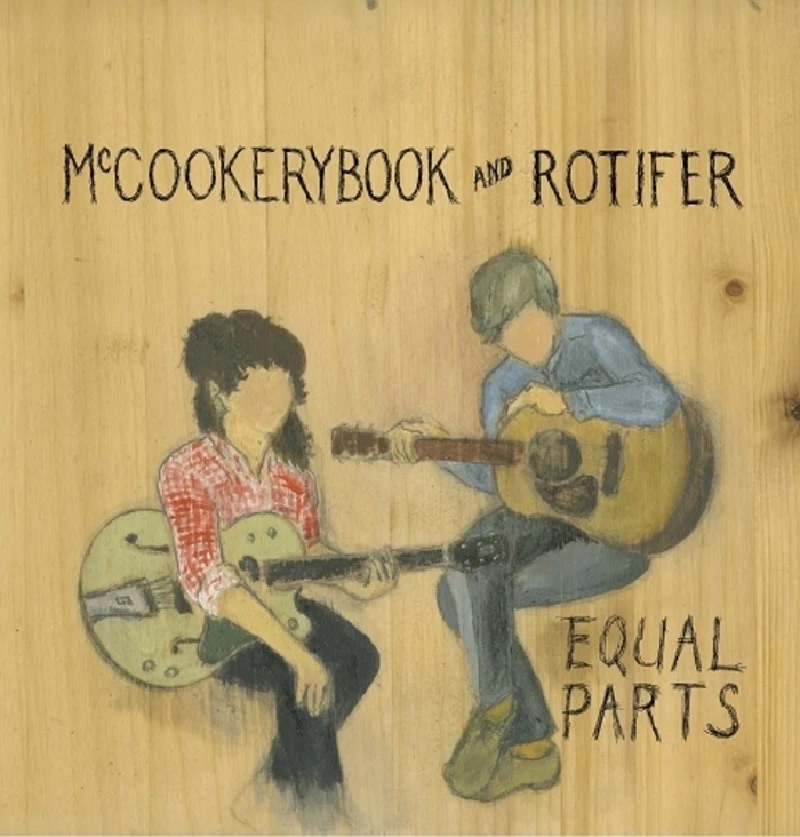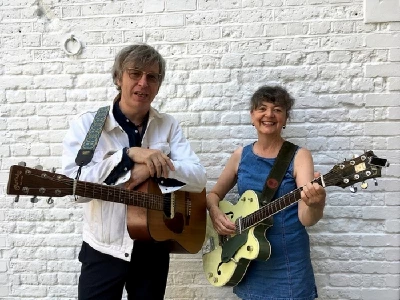McCookerybook and Rotifer - Interview Part 2
by Benjamin Howarth
published: 14 / 2 / 2021

intro
In the second of a two part interview about their new joint EP 'Equal Parts', Helen McCookerybook and Robert Rotifer talk to Ben Howarth about their discovery of each other's music and working with one another.
When we published the first half of our interview with McCookerybook & Rotifer, shortly before Christmas, they were setting about navigating the postal services in a race against the Brexit deadline. It was a close-run thing, and my copy of the vinyl arrived safely before Britain shut its doors on its European neighbours. In the first part of this interview, we learned about the making of the EP and how Brexit and the hidden political narrative were advancing while we were distracted by the pandemic influenced its lyrical narrative. This was, however, the first chance Robert Rotifer and Helen McCookerybook had to speak to one another since they’d finished recording over the summer. Although their respective homes in Barnet, North London and Canterbury, Kent wouldn’t normally be too far apart, during the pandemic, the necessary journey around the M25 wasn’t feasible. It wasn’t, therefore, a conventional interview, as they both asked each other questions, reflections on their motivations and discussed what made them want to work together. It was early November – the country was about to go into what was then billed as a ‘one month’ lockdown, but as we now know, cases of Covid-19 were rising and plan to ease restrictions again were premature. Before joining the call, Robert had been speaking to his family in Vienna, where the night before, his home city had seen a terrorist attack the evening before that. His mother had been travelling through the city at the time of the shooting, meeting people on the tram who’d heard the shots being fired. Wary of offering the kind of “ready made explanations” he was already seeing on Twitter, he did say that while there were plenty of Austrian politicians seeking to profit from the division caused by right-wing nationalism, there were signs of hope in the expressions of solidarity and community that can follow a tragedy. He hoped that the EP echoed that sentiment, with its theme of reaching out and transcending divisions. Reflecting on this, Helen adds, “any statement that artists and musicians make, it feels like a drop in the ocean. But it's still really, really important to make that statement.” Later, Robert reflected that the “open hearted” approach they’d tried to capture on the EP was not something easily found in the music scene that either of them grew up in. “There was a time in the pop culture that we grew up in,” he says, “where everything was communicated with a smirk. And that feels really wrong now. And it’s liberating to get rid of it actually.” An example he cites is Miranda Sawyer’s 1995 interview with Oasis’ Noel Gallagher where he wished death from Aids on Blur’s Damon Albarn and Alex James, which he looked into while researching an article on the 25th anniversary of Britpop. “I read that article and there was no sense of being conscious of what this meant, you know, it was just one of the quotes in the article. That’s what the 90s was like – people could print a quote like that in an article and think nothing of it. People always had to pretend that they’re, like, man enough to take the joke.” Helen – who has extensively researched female experiences in music for her book ‘Lost Women of Rock Music’ and a documentary ‘Stories From The She-Punks’ – had a break from music during the 90s, but noticed a trend of female musicians “trying desperately hard to be laddish” and a wider trend of journalists goading musicians, “from a position of such security that you could just kind of shoot weapons out left, right and centre and know that you would be okay, and not be held to account for it.” “I do actually mourn the music press”, adds Robert. “But the problem is that the music press actually made itself so unloveable when it was powerful. It’s a bit like the music industry, isn’t it?” This brings good sides and bad sides. Many of the people who made the music industry unloveable have dropped away, “because there’s no career in writing music or writing about music anymore” – but this also means that only “privileged people who can afford to make a living in a novel way can do it.” While they were able to afford to get their 10” record pressed, many artists cannot. Our conversation, however, quickly turns to the moments of serendipity that can bring artists together and promote a kind of creativity that was less likely in the days when ‘A&R’ dominated every level of the industry and to write music with someone, you’d need to be from the same town or regularly frequent the same pub in London. The path of chance encounters that saw Helen and Robert working together began when Robert toured as part of John Howard’s band the Night Mail, where in Augsberg, they play with Friedrich Sunlight (whose singer Kenji was born in Japan, sings in German and speaks English with an American accent). When Robert returned to stay with him in his Augsberg flat on a solo tour (promoting his 2017 German language album ‘Über Uns’, Kenji introduced him to Helen’s music – astonished that someone living in the UK would be unaware of her band The Chefs. Shortly afterwards, Helen saw Robert play in Louis Philippe’s band and wrote a review of the show on her blog – “Wow, that’s the person that Kenji told me about.” He eventually saw her play at a Daylight Music event in London. “Wow, I thought. She’s playing the sort of chords I like – fingerpicked with an electric Rickenbacker guitar. And from there, I’d always had it in my head that I would like to work with her… I have never asked anyone else to write with me, but there is a certain sensibility that Helen’s got that I don’t hear in other’s people’s music, especially with the chords.” Helen picks up the story – “Do you know what that night at the Lexington that was just one of the best nights of music I have been to in my life. I was blown away by Friedrich Sunlight. And then seeing Louis Phillipe, I didn't know about him either. You think you know everything about music, and then suddenly this other chamber opens. The Lexington which is just the most fantastic music venue, you just you can go there, and you don't even know the band, and you can go there and be absolutely, you know, astonished by what you're seeing.” She very rarely reviews music on her blog, conscious both that on the occasions when she has done so, she’s then been sent more music to review, without enough time to listen to it and also conscious, as a fellow musician, of the impact a bad review can have. But, occasionally, she feels “I’ve got to write about that. Because I want people to know how I feel.” The impact of nights like that at the Lexington has been for Helen to feel re-connected. “I've been out of the loop for a very, very long time”, she says, “and having access to this, you know, seeing what's going on, it's like travelling to another planet and reaching the, you know, friendly aliens and shaking hands with them and working with them.” The conversation turned back to the making of the EP at this point (which you can read about in the first part of the interview), but later, we return to the broader subject of their connection to music and other musicians – something that became especially important as Helen. Robert mentions that he’s never asked Helen what the final track ‘D-Spair’ was about, despite having wondered while they were recording it. “That’s the one song where we haven’t talked about what the lyrics are about.”. “Okay, this is deep”, Helen answers, before explaining that she wrote the lyrics while struggling with mental health. “I can remember sitting there on a chair, just looking at the sun was coming in the window, and the wind stops. There’s a really nice Dr Seuss story about Horton The Elephant, and he finds an entire planet of people on a speck of dust. And in that moment, looking at the dust in the sunlight, I thought that even when’s really shit, life is really precious and if I can for this moment take away the burdens I’m feeling, I can actually cope, here is the sun coming through the window and all this dust flying, and the sense of possibility of there being something else.” She emphasises that this moment didn’t change everything, that she subsequently had therapy, “but that moment is what the song is about.” Listening to an instrumental track that Robert sent, she found that it unlocked her ability to talk about that moment, “I felt like I was talking to the music.” She goes on to say that she finds this a weird thing to talk about, and that many people she knows didn’t realise, as she kept it private. Music helped during a particularly difficult weekend, when she went to a gig she’d been invited to through Facebook. “I made myself be sociable – I decided to talk to everybody… then the next time, people remembered me and I actually ended up working with lots of people at that gig.” From there, Helen – who had never previously been to a stadium gig – went to see Black Sabbath and then began emailing venues across the country asking for gigs. Soon, she had a nine-date tour across the country booked. “It was like a new beginning”, she said. “That’s so important”, Robert replied. He’d had a conversation with another musician recently about their difficulties asking people to listen to their music. He, however, says to Helen, “I don’t know the word – but you’re able to say 'Listen to the record I’ve got out! Come to this gig!' Whereas, on social media, often we don’t want to be seen to be self-promoting, when everyone knows that why we’re there. I do want people to listen to my music and read my articles. I feel like I have something to say.” “But you are so frank about having music out”, he tells Helen. “And I think this is really infectious. And since we do this together, I can kind of get into this as well.” The same extends to touring, with Robert admitting he finds it really hard to play shows outside of London. “You know, you turn up on your own, and the person who runs the club isn’t the person who booked you, and you soundcheck on your own, in a town you’ve never been to. It can be really daunting.” Helen, on the other hand, says that she had reached a point, she felt, “where I’ve got nothing to lose and everything is going to be an adventure. I’ve travelled all over to gigs, on my own, and I’ve done some rubbish gigs, but also some really fantastic gigs. And it’s often the ones that you think aren’t going to be good that are the best. And vice versa. But I’m very frank about publicising things. Because I feel like life is transient and, if you’ve got something to say, you really must, otherwise your life will be gone.” “It’s very noisy out there, there’s a lot of people making noise, and you can think whether you want to bore people with your stuff,” she adds. “But I have something I want to say and a way to say it. I am also a listener as well. I have interviewed people for my books and I'm really interested in people's stories. The way that I see it, it's like a river that we all jump into and we're all kind of flowing along together. And, it's by collaborating and by noticing each other’s stuff, you understand that you belong in that creative river. Because if you don't understand that, then the art of music is just going to dry up, you know?” “That positivity and urgency that you have is really infectious,” replies Robert. “I didn’t know if I was going to do anything – I’m so grateful that (collaborating with Helen) gave me an excuse to do something. It’s weird that it’s such a difficult thing, because if you do something creative, you’ve got a certain amount of confidence that you need to do it. But that destructive, sceptical voice that says, ‘Does the world really need this?’ often takes over for me. And working together was a really good way of drowning out that voice.” “I’d love to be able to turn up in a town, build an audience. And maybe with this EP, I can do that a bit in Helen’s slipstream”, Robert says. “But I should add that nobody in the UK sees the other invisible side to my music, the stuff I do in Austria and Germany. If I wasn’t for lockdown, I would have been getting on a plane and doing what would be, for me, some very big and important gigs, like the Vienna Popfest, which I helped put on for many years, and the album I did with André Heller, which did really well. He was a legend when I was growing up, and it was amazing to produce this record for him, and to do it with Andy Lewis and Ian Button alongside all these amazing Austrian musicians.” “It’s my dream”, he continues “to pull these two music scenes that are currently completely separate in my life together. That is part of what I wanted to achieve with this project, through singing in two languages. Hopefully we will get to perform the songs from the EP in Austria one day.” Postscript: Unfortunately, as I type, lockdown seems no closer to coming to an end, and as a result any plans for cross-continental gigs seem unlikely. The UK music press is fretting about the changed visa rules for musicians arising from Brexit (while seeming to brush over Britain’s historic reluctance to engage with pop music made in Europe). But you can still order the ‘Equal Parts’ EP. And you should – not just for the songwriting, which as this interview has hopefully revealed, contain hidden depths. Burt also for the melodies and the glorious guitar sound. Their collaboration, so far, amounts to a few songs recorded over a few days. They’ve not known each other for that long. And both have plenty of other projects to keep them busy. But I can’t help but hope they will write more songs together before too long. They both have more than enough to say.
Band Links:-
https://www.facebook.com/McCookerybookandRotifer/https://mccookerybookandrotifer.bandcamp.com
Play in YouTube:-
Have a Listen:-
Picture Gallery:-


interviews |
|
Interview Part 1 (2021) |

|
| Ahead of the release of their delightful collaborative EP 'Equal Parts', songwriters Helen McCookerybook and Robert Rotifer discuss the 'completely joyful' experience of recording over two days in August and their desire to use the EP to transcend the divisions between the UK and Europe brought on by Brexit. |
most viewed articles
current edition
Spear Of Destiny - InterviewRobert Forster - Interview
Fiona Hutchings - Interview
When Rivers Meet - Waterfront, Norwich, 29/5/2025
Carl Ewens - David Bowie 1964 to 1982 On Track: Every Album, Every Song
Brian Wilson - Ten Songs That Made Me Love...
Chris Wade - Interview
Pistol Daisys - Waterfront, Norwich, 29/5/2025
Credits - ARC, Liverpool, 17/5.2025
Gary Numan - Berserker
previous editions
Heavenly - P.U.N.K. Girl EPBoomtown Rats - Ten Songs That Made Me Love....
Barrie Barlow - Interview
Manic Street Preachers - (Gig of a Lifetime) Millennium Stadium, Cardiff, December 1999
Oasis - Oasis, Earl's Court, London, 1995
Dwina Gibb - Interview
Pixies - Ten Songs That Made Me Love...
David Paton - Magic: The David Paton Story
Chuck Prophet - Ten Songs That Made Me Love...
Sound - Interview with Bi Marshall Part 1
most viewed reviews
current edition
Peter Doolan - I Am a Tree Rooted to the Spot and a Snake Moves Around Me,in a CircleGarbage - Let All That We Imagine Be The Light
Vinny Peculiar - Things Too Long Left Unsaid
Little Simz - Lotus
John McKay - Sixes and #Sevens
Suzanne Vega - Flying With Angels
HAIM - I Quit
Morcheeba - Escape The Chaos
Vultures - Liz Kershaw Session 16.06.88
Billy Nomates - Metalhorse
Pennyblackmusic Regular Contributors
Adrian Janes
Amanda J. Window
Andrew Twambley
Anthony Dhanendran
Benjamin Howarth
Cila Warncke
Daniel Cressey
Darren Aston
Dastardly
Dave Goodwin
Denzil Watson
Dominic B. Simpson
Eoghan Lyng
Fiona Hutchings
Harry Sherriff
Helen Tipping
Jamie Rowland
John Clarkson
Julie Cruickshank
Kimberly Bright
Lisa Torem
Maarten Schiethart